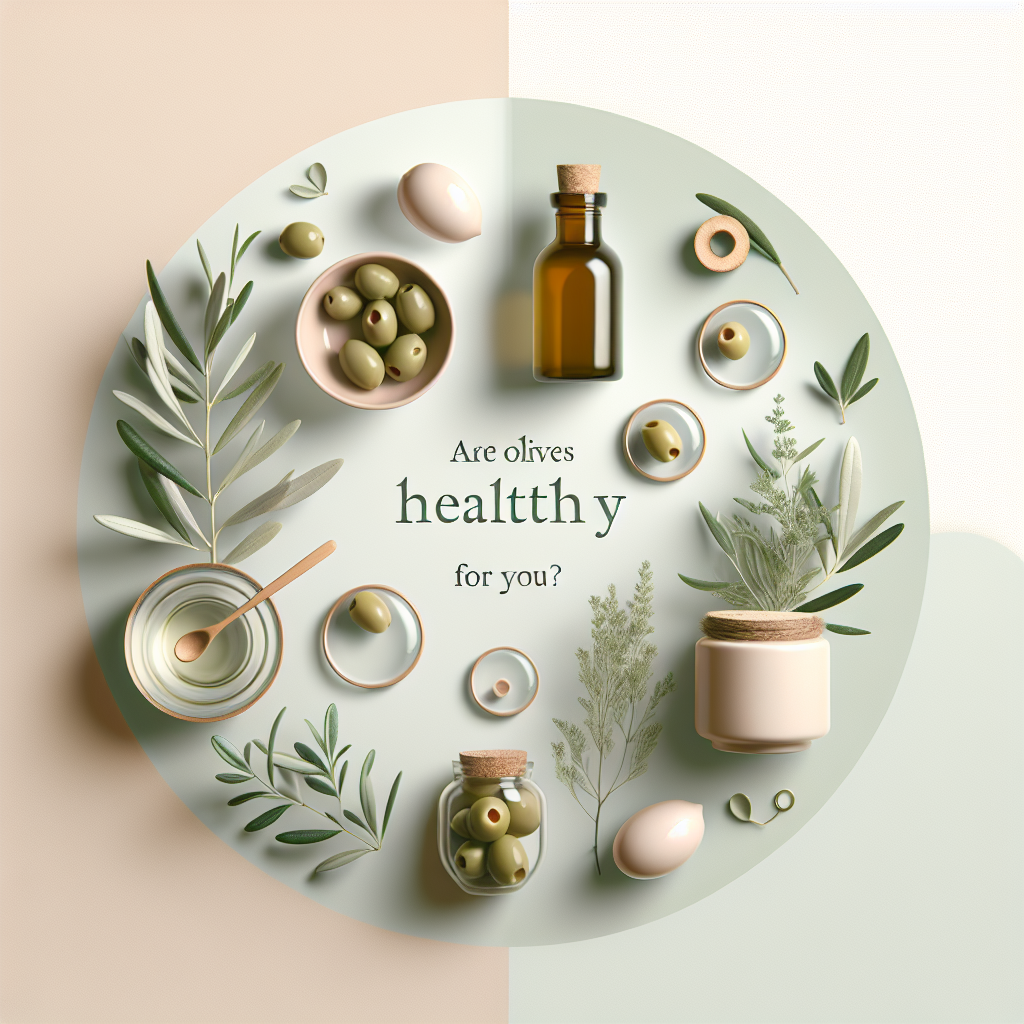
Are Olives Healthy For You?
Sarah stood in the grocery aisle, staring at the array of colorful olive jars lining the shelves. She had recently embarked on a journey towards a healthier lifestyle, motivated by her desire to improve her heart health and boost her energy levels. However, Sarah was inundated with conflicting information about olives — some hailed them as a health food, while others dismissed them due to their high-fat content. Confused, she decided it was time to uncover the truth: are olives healthy for you? Let’s delve into the facts and explore the health benefits of these small but powerful fruits.
The Nutritional Power of Olives
Olives are not just a tasty addition to pizza or salads; they pack a nutritional punch. According to the National Institutes of Health ([NIH](https://www.nih.gov/)), olives are a rich source of monounsaturated fats, which are heart-healthy fats known to lower bad cholesterol levels. Here’s what olives bring to the table:
– Healthy Fats: Comprising about 15% of their total weight, olives are an excellent source of oleic acid, a monounsaturated fat that has been studied for its potential to reduce inflammation and lower the risk of heart disease.
– Antioxidants: Olives are high in antioxidants, including vitamin E and polyphenols, which fight oxidative stress and inflammation.
– Vitamins and Minerals: They also contain significant amounts of iron, copper, calcium, and sodium, essential for maintaining overall health.
Heart Health and Olive Consumption
The Mediterranean diet, rich in olives and olive oil, is widely recognized for its heart-healthy benefits. The [Mayo Clinic](https://www.mayoclinic.org/) highlights that this dietary pattern can improve heart health with several key components:
– Lower LDL Cholesterol: Regular olive consumption can help lower low-density lipoprotein (LDL) cholesterol, known as “bad” cholesterol, reducing the risk of atherosclerosis.
– Reduced Blood Pressure: The polyphenols in olives can help relax blood vessels, thereby lowering blood pressure and reducing the risk of stroke.
Olives and Weight Management
Olives may seem like a paradox when it comes to weight management due to their high-fat content. However, the truth is quite different. According to research, the healthy fats and fiber in olives can aid in weight management:
– Satiety: The fats in olives promote a feeling of fullness, which can help control appetite and reduce overall calorie intake.
– Metabolism Boost: The nutritional profile of olives supports metabolism, potentially aiding weight loss efforts.
A Transformation Story: Mark’s Journey to Health
Mark was a 45-year-old who struggled with high cholesterol and weight gain despite eating a so-called “healthy diet.” Upon discovering the benefits of incorporating olives and olive oil into his meals, Mark witnessed a remarkable transformation. By substituting saturated fats with olives, he not only reduced his cholesterol levels but also lost 10 pounds over six months without feeling deprived. Mark’s story is a testament to the potential health benefits olives offer.
Comparing Health Benefits: Olives vs. Other Common Foods
Let’s take a look at how olives stack up against other popular foods known for their health benefits:
| Nutrient | Olives (100g) | Almonds (100g) | Avocado (100g) |
|---|---|---|---|
| Calories | 115 | 576 | 160 |
| Total Fat | 11g | 50g | 15g |
| Monounsaturated Fat | 7.9g | 32g | 10g |
| Fiber | 3.2g | 12.5g | 7g |
| Vitamin E | 3.8mg | 25mg | 2.07mg |
| Sodium | 735mg | 1mg | 7mg |
As the table shows, while almonds and avocados are also healthful choices, olives stand out with their balanced nutritional profile, particularly notable for their sodium content.
Common Concerns About Olive Consumption
When considering adding olives to your diet, common concerns may arise:
– Are olives too salty? Due to their curing process, olives can be high in sodium. Choose varieties with lower sodium content or rinse them before eating.
– Do olives contribute to weight gain? In moderation, olives can support weight management by increasing satiety without significantly increasing calorie intake.
Frequently Asked Questions
Do all olives offer the same health benefits?
Not all olives are created equal. Green and black olives offer similar health benefits, although the curing process can influence nutrient content and flavor.
Can olives improve skin health?
Yes, the antioxidants and vitamin E in olives can contribute to healthier skin by fighting oxidative damage.
Are canned olives as healthy as fresh ones?
Canned olives can be a convenient and healthy option if you choose varieties without added preservatives or excessive sodium.
Conclusion: Embrace the Health Benefits of Olives
Olives are a versatile, nutrient-dense food that can offer numerous health benefits when included as part of a balanced diet. Whether you’re aiming to improve heart health, manage your weight, or simply add delicious variety to your meals, olives are an excellent choice. Why not start incorporating olives into your diet today and experience the difference for yourself? Head to your local grocery store and bring a jar home to begin your health journey!
—
Now that you’ve discovered the numerous health benefits of olives, consider integrating them into your daily diet. With their potential to enhance overall well-being, adding olives could be a simple yet effective step towards a healthier lifestyle.
Bonus Tips for Incorporating Olives into Your Diet
1. Mix with Vegetables: Toss sliced olives into a vegetable stir-fry or salad for an extra burst of flavor and nutrients.
2. Snack Smart: Enjoy a small serving of olives as a mid-afternoon snack to curb hunger and provide a healthy dose of fats.
3. Flavor Boost: Use olives as a topping for homemade pizzas or flatbreads to add a Mediterranean flair.
4. Tapenade Spread: Blend olives with garlic, olive oil, and herbs to create a delicious tapenade perfect for spreading on whole-grain toast or using as a dip for fresh veggies.
5. Marinade Ingredient: Add chopped olives to marinades for poultry or fish to enhance flavor and tenderness.
Extra FAQs
What’s the difference between green and black olives?
Green olives are typically harvested before they’re fully ripe, while black olives are allowed to ripen on the tree longer. This difference in ripeness impacts their flavor and texture, with green olives often being firmer and more bitter, and black olives being softer and milder.
Can people with high blood pressure eat olives?
Yes, but they should opt for low-sodium varieties or rinse regular olives to help reduce the sodium content, which can be beneficial for those managing high blood pressure.
Are there any allergens in olives?
Olive allergies are uncommon, but they can occur. Those who are allergic to olives may also react to products derived from them, including olive oil.
Lifestyle Advice for Maximizing the Benefits of Olives
– Balanced Diet: While olives are healthy, they should be part of a balanced diet that includes a variety of fruits, vegetables, whole grains, lean proteins, and other healthy fats to ensure comprehensive nutrition.
– Mindful Eating: Practice mindful eating by savoring each olive and paying attention to the flavors and textures, helping to increase satisfaction and prevent overeating.
– Hydration: Due to their sodium content, balance olive consumption with adequate water intake to maintain proper hydration levels.
– Exercise Regularly: Combine a diet that includes olives with regular physical activity to enhance cardiovascular health and support weight management.
– Seasonal Eating: Explore olives within the context of seasonally available Mediterranean dishes to maximize flavor and nutritional benefits.
By following these tips and incorporating olives thoughtfully into your diet, you can enjoy their health benefits while also adding variety and excitement to your meals.






